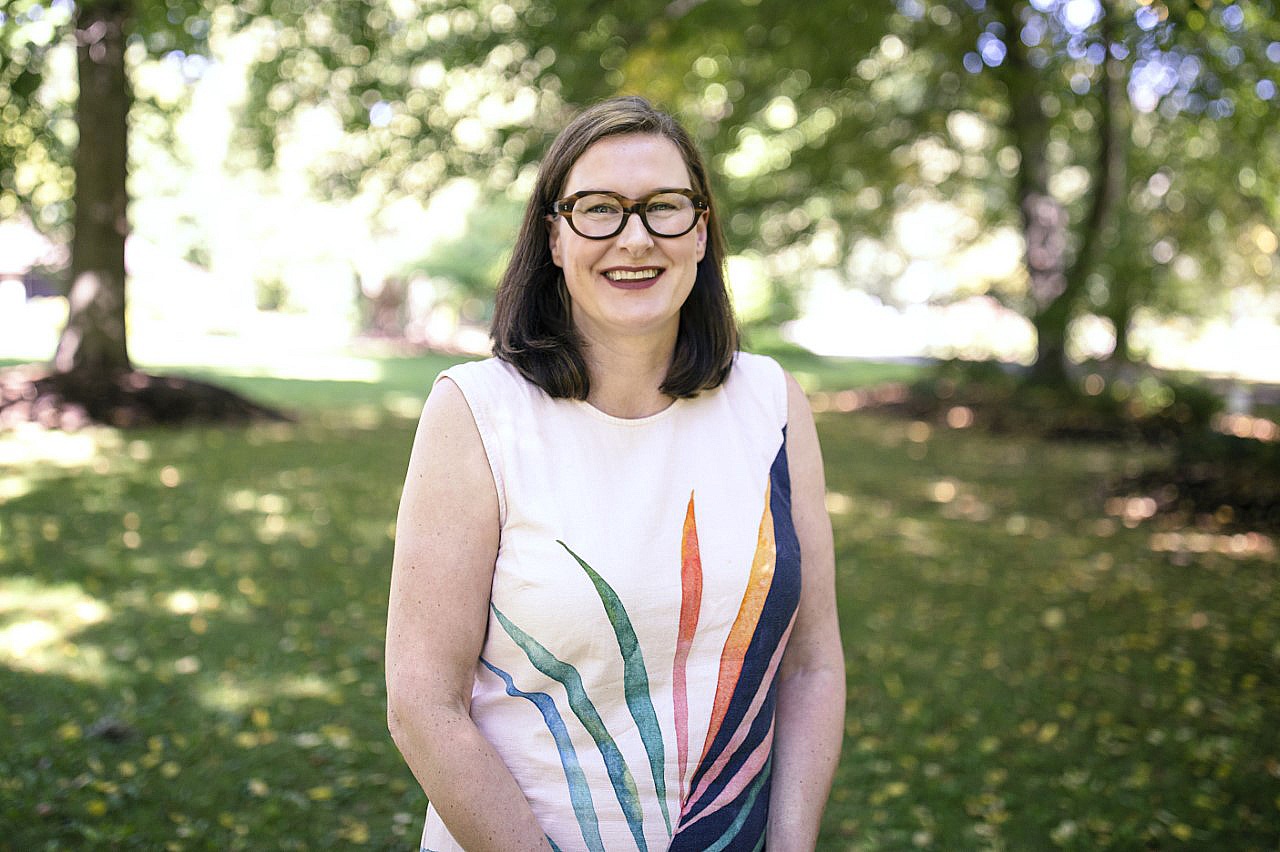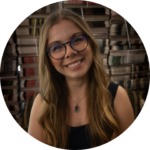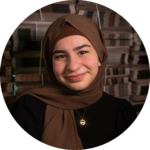My legacy is my students
Determined to inspire hope, Principal Alexandra Gillespie shares how legacies are forged every day.
In 1522, Belarusian scholar Francysk Skaryna established the first printing press. This feat came shortly after printing the Bible and Psalter in 1517 in the Ruthenian language—a language once used in today’s Belarus, Ukraine, and the Eastern Slavic region. To many, he is known as the first book printer in Eastern Europe, having created an epoch in the history of printing.
“What he did was extraordinary, […] but we remember some legacies and we don’t remember others,” says University of Toronto Mississauga (UTM) Principal Alexandra Gillespie as we sit across from her at the oval wooden desk in her bright office on the third floor of the William G. Davis Building. She’s currently writing a paper on why the first printer wasn’t the famed Francysk Skaryna, Johannes Gutenberg, or William Caxton, but rather, an empress in China in the seventh and eighth centuries who mass produced Buddhist texts. “She produced a million copies of woodblock xylographies,” continues Gillespie.
“She?!” we inquire, both surprised by the silenced story of Empress Wu (AD 625-705), who revolutionized printing during her rule. Sometimes, we do wrong to adhere to predefined societal narratives of what it means to be a leader and who can be a great one. It should not come as a surprise to hear of a woman in power, but yet, we found awe in Empress Wu’s legacy. As two women hoping to create a legacy of our own at The Medium, it’s inspiring to know that the space in which we exist is pioneered by a woman.
As a historian of technology and of the book, Principal Gillespie studies “the things folks have left behind,” she explains. “We are only here because of the people who came before. [There are] such gifts in the past and, sometimes, we don’t even know we have them. Everything we think, every word that we speak, we have because someone has given it to us.” Throughout our conversation, it’s evident that Gillespie’s research and knowledge have influenced how she leads this campus. She calls it “giving forward,” telling us it’s not just a source of joy, but also “where it all comes from.”
Whether or not one begins a leadership position with the intention of creating a great legacy, the notion of what we’ll be known for long after we leave is a discussion—both internal and external—that presents itself throughout our time as leaders. Students come to UTM from diverse backgrounds, carrying their own histories and their own legacies. “What they then go out and contribute to the world, that’s actually a legacy,” says Gillespie. This expansive web containing the unique footprints of our community is what she hopes students remember of their time at the university. “I hope no student leaves this institution thinking about me,” she shares to be her biggest wish.
The lush greenery, kind faces, and exceptional innovation of the University of Toronto Mississauga leave a lasting impression on everyone on the campus. Much of it is due to the hard work of administrators and leaders, such as Gillespie and her team. “I am very lucky and in fact, I would consider it part of my legacy to have recruited, retained—I hope, empowered—enthused, [and] livened, some really wonderful people here at UTM,” she shares. Her team enriches and challenges her thinking. They define diversity as one of the important pillars of the campus, and one she holds to be true of the leadership across UTM. However, she adds, “the degree of representation is not enough, but I’m proud of what we’ve done.”
Principal Gillespie’s team consists of a range of individuals of varying backgrounds. She admires their smarts and cherishes the intellectual traditions they contribute to how she manages the campus. But most importantly, “I really care about kindness,” she says. She values working in an environment where people are good to one another, acknowledging that this doesn’t mean they don’t disagree or argue. Gillespie emphasizes that her team and those she has entrusted with positions of power are communicative and lead with a desire to arrive at decisions in the best interest of all students. She knows that “it’s my team that produces the legacy, [it’s not] just me.”
When Gillespie was a child, she wanted to be a writer. Now, she hates writing—despite it being an integral part of her job. She finds the focus and dedication needed difficult to achieve as a mother of three, insisting on maintaining a healthy work-life balance while prioritizing her endless duties as Principal and as a parent. But also, she finds that writing limits narratives. “When you [publish writing], it pretends to be finished, right? I’m very uncomfortable with that because I think that the ideas are still alive,” she explains. When writing, there is a point where a line is drawn—when the article, book, or press release is submitted for publication. From then on, the writing exists as “a little impression, a little moment in time.” Rather, she is interested in the evolution of ideas, how knowledge is a process, and maintaining continuous conversations. She believes that there should always be an extension of the written work since creativity and innovation extend beyond the period at the end of the sentence. This is why she became a leader—to build on what was previously established.
In 2020, Gillespie joined what she describes as an “even bigger process,” and her biggest adventure yet—becoming Principal. “I didn’t want to be agonized [with writing] anymore, I wanted to be full of joy and energy.” She acknowledges that although the bigger conversation is what she is part of, the overwhelming nature of thinking about the larger ideas related to the world, politics, climate change, and even our home front, “can be hard.”
With a can of Coca-Cola in hand to revive her spirits, Principal Gillespie illustrates her hopes for students and UTM as an institution. Gillespie feels that “studying at the University of Toronto [means being] historically, and in global terms, [in] a privileged position.” Gillespie hopes for the establishment of an engineering department, as well as a nursing program to combat the increasing shortage of healthcare workers across Canada, especially in Indigenous communities.
“You have longer to do good in the world than I do,” says Gillespie, beaming with hope as she instills a sense of determination within us. Emphasizing her necessity for kindness in the workplace, she extends its importance to the UTM community by insisting that “giving people hope, enthusiasm, and courage [helps them] enjoy things that we know will help them to do good. […] That’s one of our jobs. And if we manage to do that, then that’s definitely [my] legacy.”
The notion of legacy is often reserved for leaders, but Principal Gillespie argues against this. Each student at UTM has a story of their own, filled with hopes and legacies that are unique in nature. Establishing a legacy is not dependent on how much you do, but on the quality of your work, and how you utilize the resources provided by institutions like UTM. We all have a legacy to pursue, and a drive to fulfill, as future healthcare professionals, engineers, politicians, writers, journalists, artists, and principals.



